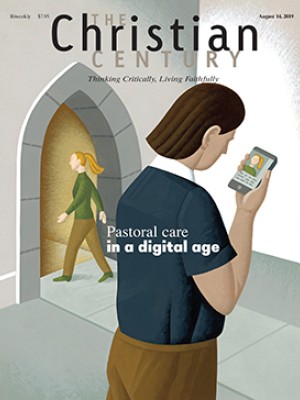Can clergy earn back the public trust they’ve lost?
Respect for pastors is at an all-time low. What would help?

There’s probably never been a time when emotionally insecure people could thrive in ordained ministry. But the current moment may be more challenging than ever given dwindling public esteem for the profession. Not since Gallup began charting the reputation of occupations in 1977 has respect for clergy been so low.
New polls by Gallup and by the Associated Press-NORC Center reveal that only 36 percent of Americans express high regard for the honesty and ethical standards of ministers. Although frequent churchgoers still hold clergy in high regard, only 52 percent of those who attend church on a monthly basis consider clergy to be trustworthy.
Read our latest issue or browse back issues.
Pastors may not yet feel as irrelevant as travel agents, parking lot attendants, or necktie sales clerks, but the influence of clergy has shrunk notably in the last two decades. Only 13 percent of regular churchgoers regularly seek advice from their clergy on ethical dilemmas or big decisions. Eighty-eight percent of people who infrequently attend church “rarely” or “never” seek clergy input.
Scandals that have rocked the church for decades no doubt contribute significantly to the drop in confidence in clergy. Clergy sexual abuse problems persist, especially in traditions with male-dominated leadership that resist structural change. Conservative evangelicals have unapologetically shaped faith claims around party politics, attracting many critics in the process. Unscrupulous greed on the part of prosperity gospel preachers has further harmed the reputation of faith communities.
Nobody wants to be irrelevant. Yet how much can pastors really do to reverse the increasing lack of interest in organized religion and religious practice that shapes attitudes toward clergy? Their position can seem like that of a piano salesman trying to convince people to revive the household sing-alongs that animated family life several generations ago. It’s an uphill slog.
But if trust is something earned, there are ways for pastors to make inroads. Pastors can first of all abandon any obsession they may have with the trappings of ministry. Anything approximating ecclesiolatry will not increase people’s confidence in church leaders. People are interested in relationships, not officiousness or expertise. Once upon a time, people may have been glad to pay homage to their pastor’s authority, since the pastor possessed superior training or expert knowledge. But when the Internet can show us how to perform an emergency appendectomy, eradicate bats from an attic, and learn Swahili, a pastor needs to be more than a resident expert, theological or otherwise.
If pastors are humble and self-aware, comfortable with their own vulnerabilities, and emotionally secure enough to weather some depressing public opinion, there’s a chance they can earn people’s trust. Our culture is hungry for clergy who are curious, deep, and relationally centered people. We need clergy to preach faith winsomely—leaders who are more concerned with the gravity of their own soul than with size of their social media following. Traits like these constitute our best hope for reversing poll trends and, not incidentally, serving the Lord more faithfully.
A version of this article appears in the print edition under the title “Can clergy regain trust?"







